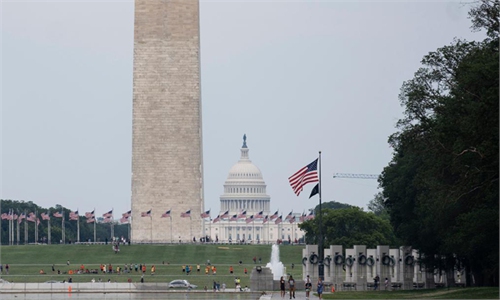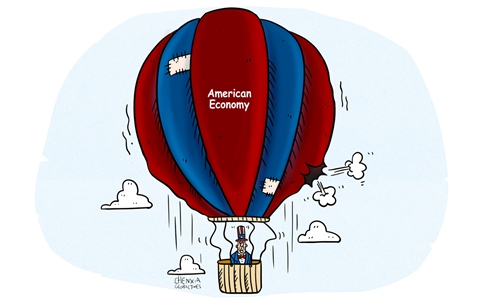COMMENTS / COLUMNISTS
Biden’s mishandling of Delta, Afghanistan bodes ill for the US

Illustration: Chen Xia/GT
The Biden administration has stumbled on nearly every major issue over the past eight months, from the botched handling of the Delta variant, surging consumer prices and across-the-board inflation at home, to a slew of foreign policy debacles including his hastened troop withdrawal from Afghanistan, the ensuing tumult and loss of lives at the Kabul airport.
The Afghan fiasco has led to most US allied countries, such as NATO, feeling betrayed, with many of them thinking the withdrawal was ill-conceived and poorly executed. Now, political infighting has engulfed Washington, with both Republicans and Democrats laying the blame on the White House.
The majority of American voters are not happy with the Biden administration either. His approval rating has fallen to its lowest point since Biden came to power in January, with 48 percent of Americans now disapproving his job performance, according to the NBC latest poll.
Increasingly, Biden's adversaries and friends across the US political spectrum view him as self-righteous, stubborn, and incompetent. The essence of his problem, many claim, is his noticeable lack of agility. He is no Bill Clinton or Barack Obama.
Before the November 2020 presidential election, Biden vowed he will undo his predecessor Donald Trump's legacy, keeping a distance with Trump's failed 'America First' agenda. Many Americans pinned much hope on Biden's team bringing "fresh air" - innovative ideas and reform measures to get their country back on track or even to a higher place than his predecessor's time. Unfortunately, Biden has increasingly proved to be an older, slower version of the former president, sticking to many of Trump's same failed policies.
Biden didn't bring any new ambition or innovation to the US' ongoing fight with Covid-19 pandemic. The president had pledged during the campaign last year, to contain new and more contagious variants of the coronavirus in the US. In July, Biden even announced that "America can beat the Delta variant", he has yet to articulate how.
His administration has failed to enforce a nationwide mask mandate, did not bother with aggressive tracing and quarantine of positive cases and their close contacts, dare not order a national lockdown, but instead, he gave a green light for pubs, cafes, restaurants, cinemas and schools to reopen too early, even while the Delta variant remains blazing out of control.
As a result, new coronavirus mutating variants have gained easy access to the US, multiplying and causing widespread illness and unnecessary death. It is particularly concerning that American hospitals are being filled with children and young people suffering from Delta. Deaths are running at more than 1,000 a day, the highest level since March, and new cases per day are averaging over 150,000 now.
What caused this malaise? There appears to be markedly little difference between Biden's muddled approach and Trump's hands-off attitude.
After coming into power, Team Biden has followed Trump's economic playbook by encouraging the US Federal Reserve to extend its historically loose financial policy - including near-zero interest rates and massive purchase of government and corporate debt. In addition, Biden has ramped up fiscal stimulus measures, pushing the Democrat-controlled Congress pass trillions of dollars in new government spending.
The excess liquidity of the US dollars has caused a round of strong consumer inflation at home, with prices of raw materials, electronics and cars all surging, making ordinary American wage-earners' life harder.
Biden was once broadly regarded as a foreign policy "expert" or "authority" in the US, as he has served as chairman of the Senate Foreign Affairs Committee for many years, and as vice-president in the Obama administration for eight years. But in April this year, he abruptly announced that he would adhere to Trump's negotiated pact with the Taliban and Afghan government, by ordering to withdraw all American troops before August 31.
Perhaps, Biden had a vision of a glorious troop home-coming celebration party in Washington before September 11 to celebrate America's 20-year-long war in Afghanistan. But Biden clearly placed too higher confidence in his team of national security advisors - and America's intelligence apparatus in particular -- that America's ally, President Ashraf Ghani (who has since fled to the UAE) and US trained Afghan troops were able to resist the Taliban and hold on to power in Kabul for at least a year.
It turned out America's intelligence was seriously flawed, and Biden's national security advisors simply nodded and bowed to the will of an increasingly frail and muddled commander-in-chief.
Team Biden was stunned after the Taliban took all provincial capitals in Afghanistan and Kabul in a lightening pace, and the team's complacence vanished completely on Thursday when the jihadists attacked the Kabul international airport, killing 13 American soldiers and wounding 15, as well as killing more than 170 Afghans. Biden has vowed to retaliate, saying "we will hunt you down and make you pay", how this revenge mission will take shape remains largely unknown.
There are more foreign policy dilemmas facing Biden and his team. Does the Jihadist attack indicate that ISIS will continue to pose a long-term security threat to America?
America has now occupied Afghanistan for 20 years, and Washington has spent more than $2 trillion, with much of this money spent attempting to cultivate a loyal and competent ally in Kabul. But the facts are grim. Afghanistan remains largely chaotic, and is not stable enough for the American troops and their Afghan allies to evacuate safely.
Some US media outlets have highlighted that American soldiers have been either killed or maimed have paid a heavy price for Biden's bungled exit strategy. Typically, this sort of military withdrawal would have required Biden to insist on robust, cross-agency planning. Apparently he didn't. When Biden announced the withdrawal in April, why didn't the State Department ramp up the special visa program for Afghan allies, and where were Pentagon top-brass in devising a sensible plan for withdrawal of its troops and military equipment?
These eight months of failure have left many Americans asking, will the Biden-Harris administration be ready for the next crisis when it comes over the horizon?
The author is an editor with the Global Times. bizopinion@globaltimes.com.cn



